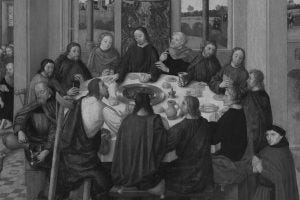I attended an event this past weekend where the question was raised as to how it would be possible to convince a majority of individuals to adopt an economic position that is currently considered fringe. The answer given was that there is no way to achieve this goal at the current time. And that opinion is one I definitely agree with because those holding that fringe position do not currently have the influence, nor do they control the communication apparatus (propaganda machine) to convey to people that "this is now the position you should hold on this economic subject." It really is that simple.
Let’s flip this around: consider a scenario in which a majority of individuals hold to a political position but are unable to have it codified into law or have the law that goes against their opinion eliminated. You have to ask yourself, why does it appear that this majority of people can’t get their political preferences cemented in law? In the Supreme Court decision Obergefell v. Hodges, a non-elected, lifetime-appointed body of nine judges went against the wishes of the majority of Americans and legalized homosexual marriage. The fact that the Court contained a majority of "conservative" judges did not stop this decision from being passed. So while the majority may desire a political outcome, it is a small cabal pulling the strings—not only of the aforementioned propaganda machine but within the halls of power as well.
What is witnessed in both of these scenarios is an example of how an organized minority imposes its will on a disorganized majority. A small, well-coordinated, well-funded cabal always appears to be in charge, and the reason for that is: it’s easier for 100 people to plot and scheme together to accomplish their goals than it is for 300 million. This is inarguable. In order for those 300 million people to achieve their political aims, they would need their own small cabal to defeat the cabal currently in charge. But even a scenario where 300 million people control 100 people who would push their agenda appears unlikely. What manifests in reality more often than not is that elites raise themselves up, adopt one or two desires that the masses may want, overthrow the current group of elites (the cabal), and then give the masses one or two of their wishes to keep them “happy,” while proceeding with whatever motivation led them to take action in the first place.
If you are someone who has adopted a top-down ideology in which you believe you will see your "utopia" manifested one day, I’m sorry to burst your bubble, but a small cabal of elites calling the shots is the way the West is run now. I can immediately think of two "solutions" to this dilemma, and I assume you can guess the first if you’re a long-time reader or listener of mine. Radical localization of politics can allow a small group of people who share the same values to run for key local political positions and become that small, organized group that can get their preferences codified into law. The second “solution” would be to raise up your own elites with the long-term goal of acquiring and building power on a larger scale. Either way, your friends are now in charge and, as I mentioned in my previous Substack, the all-seeing eye of power is no longer focused on you.





I just got done reading the book 'No Country for Old Men'. The movie is fantastic. The book is exquisite, and spends more time (about 1/3rd per character) on Sheriff Bell. Much of the time is his lament of what has become and what once was......and this book takes place in 1980, when I was 11 years old. Towards the end, they are discussing the demise of Llewellyn Moss and how he was a Vietnam veteran. Bell paraphrases an old timer: 'Some say that Vietnam was the event that started the demise of this country. It was not. It started when people stopped saying "Yes, Ma'am. Yes, Sir. No Ma'am. No Sir'. The implication being that the culture changed, the mores changed and then people changed for the worse. He talked about a man who had carved a water trough out of rock, by hand, on an old property. The house that was there was long gone, but the trough was there. Too heavy to move and would be there for hundreds of years. He said: 'This land at that time (1870s) was full of violence and war. What made that man take the time to make something like that?'. He asked it with no answer. I would say it went back to the former point about the culture and mores. Even though he was surrounded by uncertainty and the possibility of violent death, he still knew the beautiful, the value of hard work, honor, deference and respect.
What does that have to do with this post? I don't know. Maybe it's that it all depends on the types of the 100 people you have who shape and change the destiny of the rest. I liked those men who did so in the late 1700s, even if a lot of what happened is romanticized. They sacrificed, lost everything, even their lives.
Honor, faith, loyalty and sacrifice will be part of what builds a new society from the trash we are in now, Peter.
Organize organize organize. Find your people, coordinate, and bully degeneracy in your area. Do not fear conflict with others. They will follow the tides. As Pete has mentioned many times, examine how they responded to the coov.